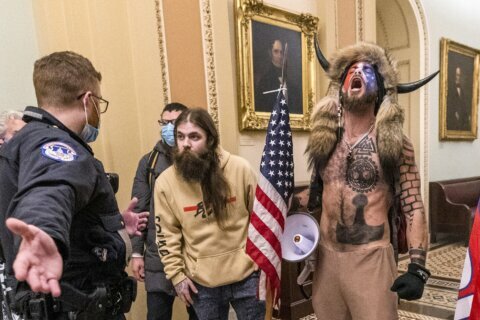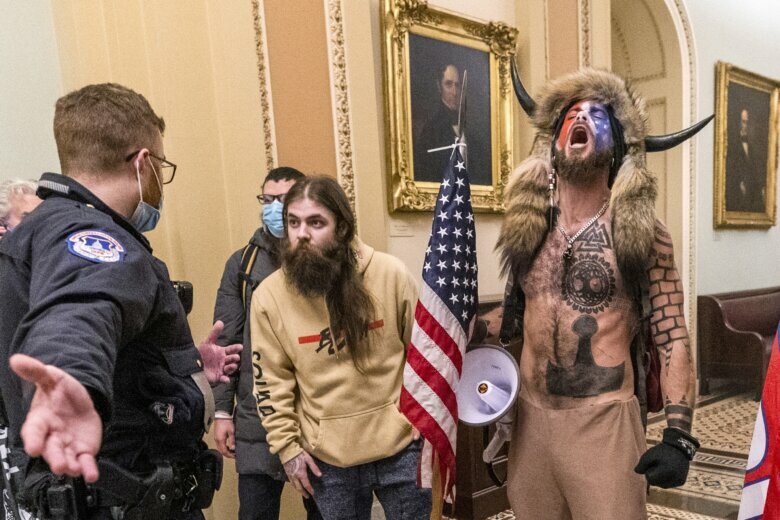
PROVIDENCE, R.I. (AP) — Falsehoods about the election helped bring insurrectionists to the Capitol on Jan. 6, and now some who are facing criminal charges for their actions during the riot hope their gullibility might save them or at least engender some sympathy.
Lawyers for at least three defendants charged in connection with the violent siege tell The Associated Press that they will blame election misinformation and conspiracy theories, much of it pushed by then-President Donald Trump, for misleading their clients. The attorneys say those who spread that misinformation bear as much responsibility for the violence as do those who participated in the actual breach of the Capitol.
“I kind of sound like an idiot now saying it, but my faith was in him,” defendant Anthony Antonio said, speaking of Trump. Antonio said he wasn’t interested in politics before pandemic boredom led him to conservative cable news and right-wing social media. “I think they did a great job of convincing people.”
After Joe Biden’s victory in last year’s presidential election, Trump and his allies repeatedly claimed that the race was stolen, even though the claims have been repeatedly debunked by officials from both parties, outside experts and courts in several states and Trump’s own attorney general. In many cases, the baseless claims about vote dumps, ballot fraud and corrupt election officials were amplified on social media, building Trump’s campaign to undermine faith in the election that began long before November.
The tide of misinformation continues to spread, U.S. District Judge Amy Berman Jackson wrote Wednesday in a decision denying the release of a man accused of threatening to kill U.S. House Speaker Nancy Pelosi, D-Calif.
“The steady drumbeat that inspired defendant to take up arms has not faded away,” Berman wrote in her ruling ordering Cleveland Grover Meredith Jr. to remain in custody. “Six months later, the canard that the election was stolen is being repeated daily on major news outlets and from the corridors of power in state and federal government, not to mention in the near-daily fulminations of the former president.”
The defendants represent only a fraction of the more than 400 people charged in the failed attempt to disrupt the certification of Biden’s victory. But their arguments highlight the important role that the falsehoods played in inspiring the riot, especially as many top Republicans try to minimize the violence of Jan. 6 and millions of others still wrongly believe the election was stolen.
At least one of those charged plans to make misinformation a key part of his defense.
Albert Watkins, the St. Louis attorney representing Jacob Chansley, the so-called QAnon shaman, likened the process to brainwashing, or falling into the clutches of a cult. Repeated exposure to falsehood and incendiary rhetoric, Watkins said, ultimately overwhelmed his client’s ability to discern reality.
“He is not crazy,” Watkins said. “The people who fell in love with (cult leader) Jim Jones and went down to Guyana, they had husbands and wives and lives. And then they drank the Kool-Aid.”
Similar legal arguments failed to exonerate Lee Boyd Malvo, who at age 17 joined John Allen Mohammed in a sniper spree that killed 10 people in the Washington, D.C., area in 2002. His lawyers tried to argue that Malvo wasn’t responsible for his actions because he had been deluded by the older Mohammed.
Attorneys for newspaper heiress Patty Hearst also argued, unsuccessfully, that their client had been brainwashed into participating in a bank robbery after being kidnapped by the radical Symbionese Liberation Army group.
“It’s not an argument I’ve seen win,” said Christopher Slobogin, director of Vanderbilt Law School’s Criminal Justice Program, a psychiatry professor and an expert on mental competency.
Slobogin said that unless belief in a conspiracy theory is used as evidence of a larger, diagnosable mental illness — say, paranoia — it’s unlikely to overcome the law’s presumption of competence.
“I’m not blaming defense attorneys for bringing this up,” he said. “You pull out all the stops and make all the arguments you can make,” he said. ”But just because you have a fixed, false belief that the election was stolen doesn’t mean you can storm the Capitol.”
From a mental health perspective, conspiracy theories can impact a person’s actions, said Ziv Cohen, a professor of psychiatry at Weill Cornell Medical College of Cornell University. Cohen, an expert on conspiracy theories and radicalization, often performs mental competency exams for defendants.
“Conspiracy theories may lead people to commit unlawful behavior,” Cohen said. “That’s one of the dangers. Conspiracy theories erode social capital. They erode trust in authority and institutions.”
Lawyers for Bruno Joseph Cua, a 19-year-old accused of shoving a police officer outside the U.S. Senate chamber, attributed his client’s extremist rhetoric before and after the riot to social media. Attorney Jonathan Jeffress said Cua was “parroting what he heard and saw on social media. Mr. Cua did not come up with these ideas on his own; he was fed them.”
In a Parler posting a day after the riot, Cua wrote: “The tree of liberty often has to be watered from the blood of tyrants. And the tree is thirsty.”
Cua’s attorney now characterizes such comments as bluster from an impressionable young person and said Cua regrets his actions.
Antonio, 27, was working as a solar panel salesman in suburban Chicago when the pandemic shut down his work. He and his roommates began watching Fox News almost all day long, and Antonio began posting and sharing right-wing content on TikTok.
Even though he’d never been interested in politics before — or even voted in a presidential election — Antonio said he began to be consumed by conspiracy theories that the election was rigged.
Court records portray Antonio as aggressive and belligerent. According to FBI reports, he threw a water bottle at a Capitol police officer who was being dragged down the building’s steps, destroyed office furniture and was captured on police body cameras yelling “You want war? We got war. 1776 all over again” at officers.
Antonio, who wore a patch for the far-right anti-government militia group The Three Percenters, is charged with five counts, including violent entry and disorderly conduct on Capitol grounds and obstruction of law enforcement during civil disorder.
Joseph Hurley, Antonio’s lawyer, said he won’t use his client’s belief in false claims of election fraud in an attempt to exonerate him. Instead, Hurley will use them to argue that Antonio was an impressionable person who got exploited by Trump and his allies.
“You can catch this disease,” Hurley said. Misinformation, he said, “is not a defense. It’s not. But it will be brought up to say: This is why he was here. The reason he was there is because he was a dumbass and believed what he heard on Fox News.”
___
Associated Press writer Jacques Billeaud in Phoenix contributed to this report.
Copyright © 2026 The Associated Press. All rights reserved. This material may not be published, broadcast, written or redistributed.








